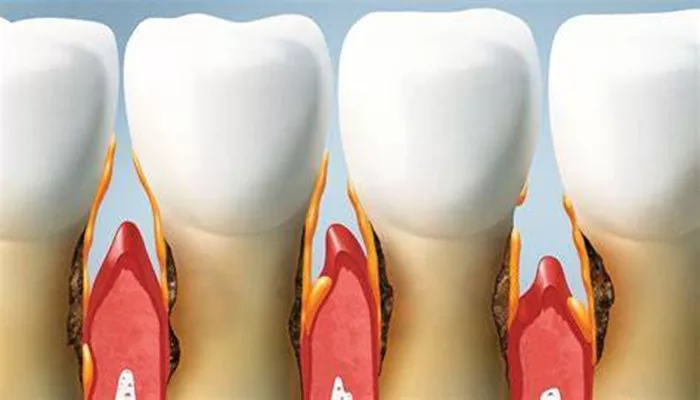Periodontal pockets are spaces that develop between the teeth and gums due to gum disease. These pockets can harbor bacteria, leading to further inflammation and potential tooth loss if left untreated.
Understanding how to reduce these pockets naturally is essential for maintaining good oral health. This article will explore the causes of periodontal pockets, effective natural remedies, and lifestyle changes that can help improve gum health.
What Is Periodontal Pockets?
Periodontal pockets form when the gum tissue pulls away from the teeth. This can happen due to various factors, including poor oral hygiene, plaque buildup, and gum disease. In healthy gums, there is a small space between the gums and teeth, typically between 1 and 3 millimeters deep. However, when this space deepens beyond 3 millimeters, it indicates the presence of periodontal pockets.
Causes of Periodontal Pockets
Several factors contribute to the development of periodontal pockets:
Poor Oral Hygiene: Inadequate brushing and flossing allow plaque to accumulate. This plaque can harden into tartar, which irritates the gums.
Smoking: Tobacco use is a significant risk factor for gum disease. It reduces blood flow to the gums, making it harder for them to heal.
Hormonal Changes: Hormonal fluctuations during puberty, pregnancy, and menopause can make gums more sensitive and prone to disease.
Nutritional Deficiencies: A lack of essential vitamins, particularly vitamin C, can weaken gum tissue and increase the risk of gum disease.
Medical Conditions: Certain conditions, such as diabetes, can affect blood sugar levels and impair gum health.
Stress: High stress levels can weaken the immune system, making it harder for the body to fight off infections, including gum disease.
see also: How Often Do You Need a Deep Cleaning with Periodontal Disease
Importance of Reducing Periodontal Pockets
Reducing periodontal pockets is crucial for several reasons:
Prevent Tooth Loss: If left untreated, deep pockets can lead to tooth mobility and eventual tooth loss.
Improve Oral Health: Healthy gums contribute to overall oral health and reduce the risk of systemic diseases linked to gum disease.
Enhance Aesthetic Appearance: Healthy gums improve the appearance of your smile, making it more attractive.
Natural Ways to Reduce Periodontal Pockets
There are several natural methods to help reduce periodontal pockets.
These methods focus on improving oral hygiene, using home remedies, and making lifestyle changes.
1. Improving Oral Hygiene
Good oral hygiene is the foundation for preventing and reducing periodontal pockets. Here are some steps to improve your oral hygiene:
Brush Twice Daily: Brush your teeth at least twice a day using a soft-bristled toothbrush. Use gentle, circular motions to clean the teeth and gums effectively.
Use Fluoride Toothpaste: Choose a fluoride toothpaste that helps fight cavities and strengthen enamel.
Floss Daily: Flossing removes plaque and food particles between the teeth and under the gum line. This is crucial for preventing gum disease.
Use an Antiseptic Mouthwash: Rinse with an antiseptic mouthwash to help reduce bacteria in the mouth. Look for mouthwashes that contain chlorhexidine or essential oils.
2. Home Remedies to Reduce Periodontal Pockets
Several home remedies can help improve gum health and reduce the size of periodontal pockets:
Saltwater Rinse: Mix half a teaspoon of salt in a glass of warm water.
Rinse your mouth with this solution for 30 seconds, three times a day.
Saltwater can help reduce inflammation and promote healing.
Oil Pulling: This ancient practice involves swishing oil (such as coconut or sesame oil) in your mouth for 5 to 10 minutes.
Oil pulling may help reduce bacteria and improve gum health.
Aloe Vera Gel: Aloe vera has anti-inflammatory properties that can soothe irritated gums. Apply aloe vera gel directly to the gums and let it sit for 10 minutes before rinsing.
Vitamin C: Vitamin C is essential for gum health. Incorporate foods rich in vitamin C, such as oranges, strawberries, and bell peppers, into your diet. You may also consider taking a vitamin C supplement after consulting your doctor.
Omega-3 Fatty Acids: These fatty acids have anti-inflammatory properties that can benefit gum health. Include sources of omega-3s in your diet, such as fatty fish, flaxseeds, and walnuts.
3. Lifestyle Changes
Making certain lifestyle changes can significantly impact gum health and help reduce periodontal pockets:
Quit Smoking: If you smoke, consider quitting. Smoking is a major risk factor for gum disease and can hinder healing.
Manage Stress: Find ways to manage stress, such as practicing yoga, meditation, or deep breathing exercises. Reducing stress can improve overall health and support gum healing.
Eat a Balanced Diet: Focus on a diet rich in fruits, vegetables, whole grains, and lean proteins. Avoid sugary snacks and beverages that can contribute to plaque buildup.
Stay Hydrated: Drink plenty of water throughout the day. Staying hydrated helps keep your mouth moist and flushes away food particles and bacteria.
Regular Dental Visits: Schedule regular checkups with your dentist every six months. Professional cleanings can remove plaque and tartar buildup that home care may miss.
Monitoring Progress
As you implement these natural methods, it is essential to monitor your progress. Pay attention to any changes in the size of your periodontal pockets and overall gum health. You can use the following indicators to assess improvement:
Reduced Bleeding: Healthy gums should not bleed during brushing or flossing. If you notice reduced bleeding, it may indicate improved gum health.
Less Swelling: Swelling and inflammation are signs of gum disease. A decrease in swelling suggests that your gums are healing.
Shallower Pockets: If you have previously measured the depth of your periodontal pockets, you can monitor changes over time. A reduction in pocket depth is a positive sign.
Conclusion
Reducing periodontal pockets naturally is possible through improved oral hygiene, home remedies, and lifestyle changes. By taking proactive steps to care for your gums, you can prevent further progression of gum disease and maintain good oral health. Remember that while natural remedies can be beneficial, regular dental visits are essential for monitoring your gum health and addressing any concerns.

